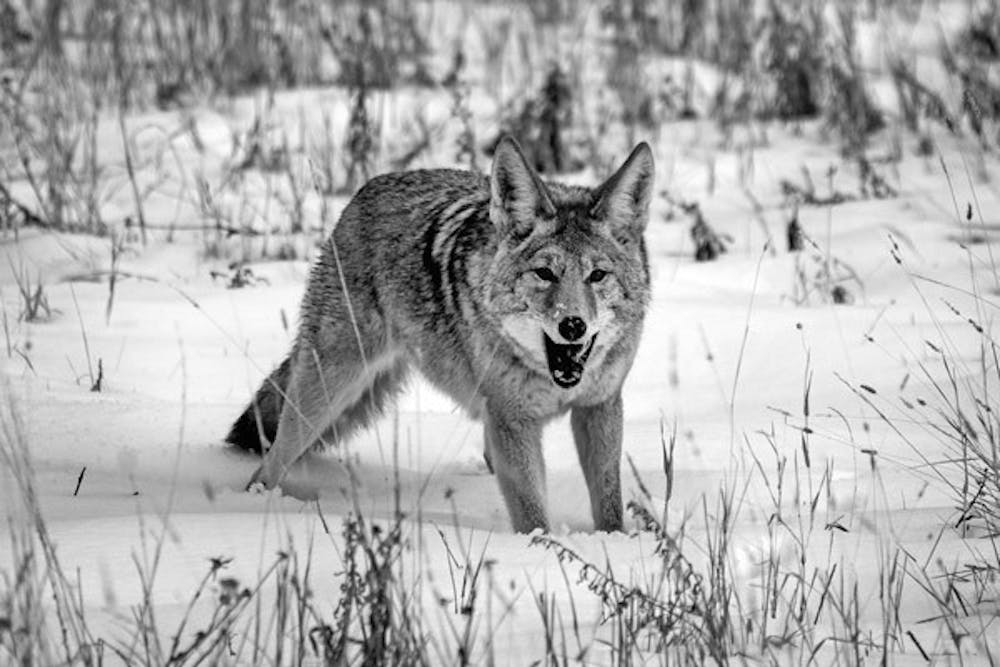MONTPELIER — On Wednesday, Feb. 21, the ban on holding or participating in coyote-killing tournaments passed the Vermont House on a vote of 79–45. It now sits in the Senate Natural Resources Committee for further action. The ban was included as an amendment in a major bill on fish and wildlife that passed the House.
Under the amendment, penalties for violation of the ban will include a fine up to $1,000 and 60 days in jail for first-time offenders and a fine of $4,000 for second-time offenders. In deciding whether to support or remove the ban, the House’s debate moved beyond concerns about protecting the coyote population. It also touched upon the social interactions of wild animals with Vermont citizens in general and the significance of hunting culture in the state.
Republican Representative Brian Smith, who has resided and advocated in the small town of Derby in Orleans County, has firsthand concerns about the growing population of coyotes in Vermont and the potential danger brought by the close proximity of coyotes to human beings in rural areas. Smith said that he recently shot a coyote only 400 yards behind a deer at the back of his house.
“There are many more [coyotes] than there used to be ten years ago,” said Rep. Smith. “I can hear them within 500 yards of my house, and it makes the hair on the back of your neck stand up.”
Known to be one of the smartest and most cunning creatures in Vermont, coyotes “eat everything,” “live everywhere” and often howl at night, leaving people with a mystical yet haunting sound.
“Once in a while, one starts screaming and the other will get into fights with its brothers. And the parents get in and they all start howling at each other,” Rep. Smith said. “Or they will get a baby rabbit or a dead raccoon. And they will fight over it. You never know what they are doing.”
Smith believes there are too many coyotes right now and that they do not contribute to the overall ecosystem in any ways other than devouring animals and getting into the garbage.
“There are only a few, very very few, groups that hunt these coyotes and create contests,” Rep. Smith noted. “I don’t see any harm in 25 or 30 coyotes going out or having a fun day or fun weekend of hunting. It’s not affecting anybody.”
With two or three courses during the winter, these coyote-killing competitions are not constant and usually last for one day or one weekend. In comparison to “real hunts,” Smith regards the coyote tournaments as more of a social event or an occasion for people to gather together.
“I don’t believe the non-hunting community understands what these hunts are all about: a bunch of real good people that are very conscientious sportsmen,” Smith said. “They are hunting an animal that is a lot smarter than they are. So the chances of succeeding are very, very slim. It makes for a pretty good gathering of a good bunch of people.”
In contrast, Rep. David Deen, the chairman of the House Committee on Natural Resources, Fish and Wildlife, supports the ban. “This type of contest violates the North American Model of Wildlife Conservation that has guided our actions in wildlife conservation since the mid 1800s,” said Rep. Deen.
The North American Model of Wildlife Conservation that Deen mentioned was set in the 1800s by hunters and anglers to set certain limits in order to manage wild habitats and protect wildlife.
“The particular principal violated would be: ‘wanton waste of killing an animal must have a purpose and the animal should be used.’ A dead coyote stacked to see whose pile is the highest is not appropriate use of the animal,” Deen said.
According to the Vermont Fish & Wildlife Department website, eastern coyotes are not only “incredibly adaptable” as relative newcomers to Vermont, but have also become “successful predators” among the established fauna of Vermont.
“They have become one of the top predators and that means they have a vital role in a healthy ecosystem,” Rep. Deen said.
While the original penalty section of the bill includes a maximum 60 days in jail, it was later removed in the final approved version on Thursday afternoon. Although Deen acknowledged the shortage of time in preparing for the jail-time penalty, he also stressed the seriousness of the crime behind coyote-killing competitions.
However, some House members disagree with the proposed degree of punishment. In an article in Valley News, supporter of the ban Rep. Susan Buckholz expressed her disapproval at the tough penalty of the bill. “This is not something that the judiciary and corrections should have to deal with,” Rep. Buckholz said in an interview. “This is something new, and an animal that you can take out any time during the year. To send somebody to jail for this is beyond me.”
Vermont Public Radio estimated that there are 6,000 to 9,000 coyotes in Vermont. Prior to the ban, there were no time restrictions for hunting them within the state. While some argue that there is a potential danger imposed by the growing population of coyotes and that there is a social pleasure in gathering during these competitions, others aim for an ecosystem that is protected more greatly by wildlife conservation and a paradigm shift of the hunting culture in Vermont.




